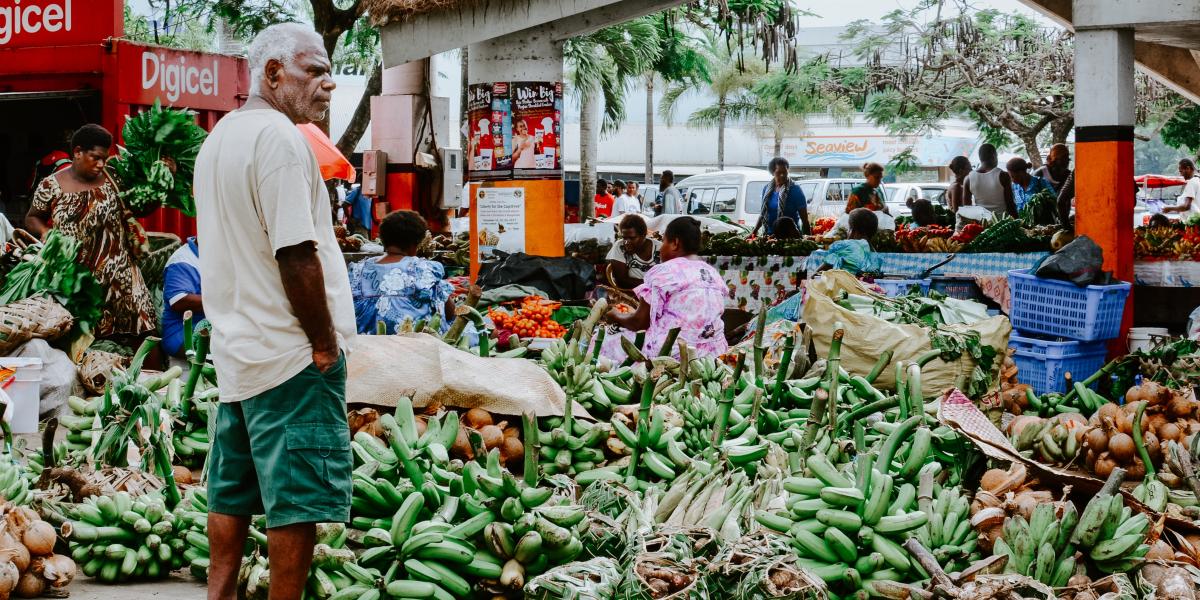
In today’s heavily interconnected global society, it is commonplace to exchange goods and services on an international playing field. While international trade facilitates access to new products and presents opportunities to enter new markets, there are drawbacks to this connectivity, and the COVID-19 global pandemic revealed many of these weaknesses.
Food systems in particular have responded to the initial shock of COVID-19 with varying levels of resilience in different corners of the world. emLab postdoctoral researcher Dr. Caroline Ferguson is a marine social scientist who focuses on equity and justice in fisheries management, and prior to joining emLab, she led an investigation into whether increased connectivity reduces or enhances resilience in the context of rural Pacific food systems during the early stages of the COVID-19 pandemic.
The study’s locally-based coauthors conducted hundreds of interviews across 199 coastal villages and seven countries from May to October 2020 to examine how Pacific island communities adapted to the initial global shocks associated with the pandemic to ensure food security. The study found that rural Pacific Island communities that have maintained traditional practices around food production and food sharing were better able to weather the initial impacts of COVID-19.
Producing your own food using traditional agricultural methods like cultivating native crops in small plots would help to make you less reliant on imports and more food secure, especially during a time when international trade has grinded to a halt. This was evident in communities in countries like Fiji that are more reliant on imports, where interviewees were almost twice as likely to report food insecurity.
But in addition to traditional production, traditional practices also appeared to play an important role in bolstering food security. In communities that practiced the tradition of food sharing – the sharing of food along kinship lines and with anyone in the community who lacks it – reports of food insecurity were significantly lower.
The principles of solidarity, reciprocity, and collective support are culturally rooted in Pacific Island communities, and previous studies have highlighted the importance of food sharing networks to social-ecological systems resilience in the region. Reciprocal exchange of resources and knowledge can facilitate recovery after major disturbances, which was reflected in the food sharing findings, but also in the response of local fisheries to the food system disruptions caused by COVID-19.
Increases in fishing pressure typically follow catastrophic events that disrupt local food systems as communities try to make up for losses by fishing more. But with COVID-19, the study found that agriculture was the main way people adapted, particularly in areas where there was migration from urban areas following a rise in unemployment. In most places, the study did not find a significant increase in fishing, and some communities even reported decreases in fishing pressure.
“I think this finding really speaks to the strength of traditional values and resource management practices. These communities have enough intergenerational knowledge and collective experience to know that although times are tough, you don’t want to act in a way that could deplete your resources in the longer-term,” said Ferguson.
These findings contribute to an established evidence base that highlights the value of traditional and indigenous ways of knowing, but alone, give us an incomplete picture of the relationship between interconnectedness and resilience to major shocks.
Just before and during the interview period, some of the study countries experienced severe tropical cyclones that damaged existing agricultural infrastructure and made it difficult or impossible to increase food production locally. In the hardest-hit communities, interviewees reported that they supplemented their diets with imported products like rice and flour, and also turned to seafood.
Collectively, these findings suggest that Pacific states should maintain a balanced portfolio of food provision approaches: avoiding becoming overly reliant on food imports to provide some insulation from global shocks, while having measures in place to support food security after natural disasters that impact local resources, supplementing locally produced and preserved foods with imported foods when necessary.
“There is immense pressure to provide economic opportunities to rural areas of the Pacific. But economic development has to be done in balance with other benefits, as there is great value in maintaining traditional food systems that, as the study suggests, provided the social safety net for communities,” said Dr. Sangeeta Mangubhai, a study coauthor and Pew Marine Fellow in Fiji.
Ferguson and co-authors Mangubhai and Teri Tuxson are continuing their work on traditional knowledge and practices in the context of fisheries management in Fiji. With support from the Blue Prosperity Coalition, they are examining fisher compliance with the two modern Fijian management systems: one that is based on customary marine Fijian governance under the authority of village leaders, and one with a more centralized approach, based on Western resource management models introduced during the British colonial period.
The study team aims to investigate why a fisher may or may not comply with either, both, or neither of the two systems and what level of participation is afforded to women and men in the two systems. Their goal is to highlight the significant but often overlooked roles of women and to inform more robust co-management practices in Fiji.



